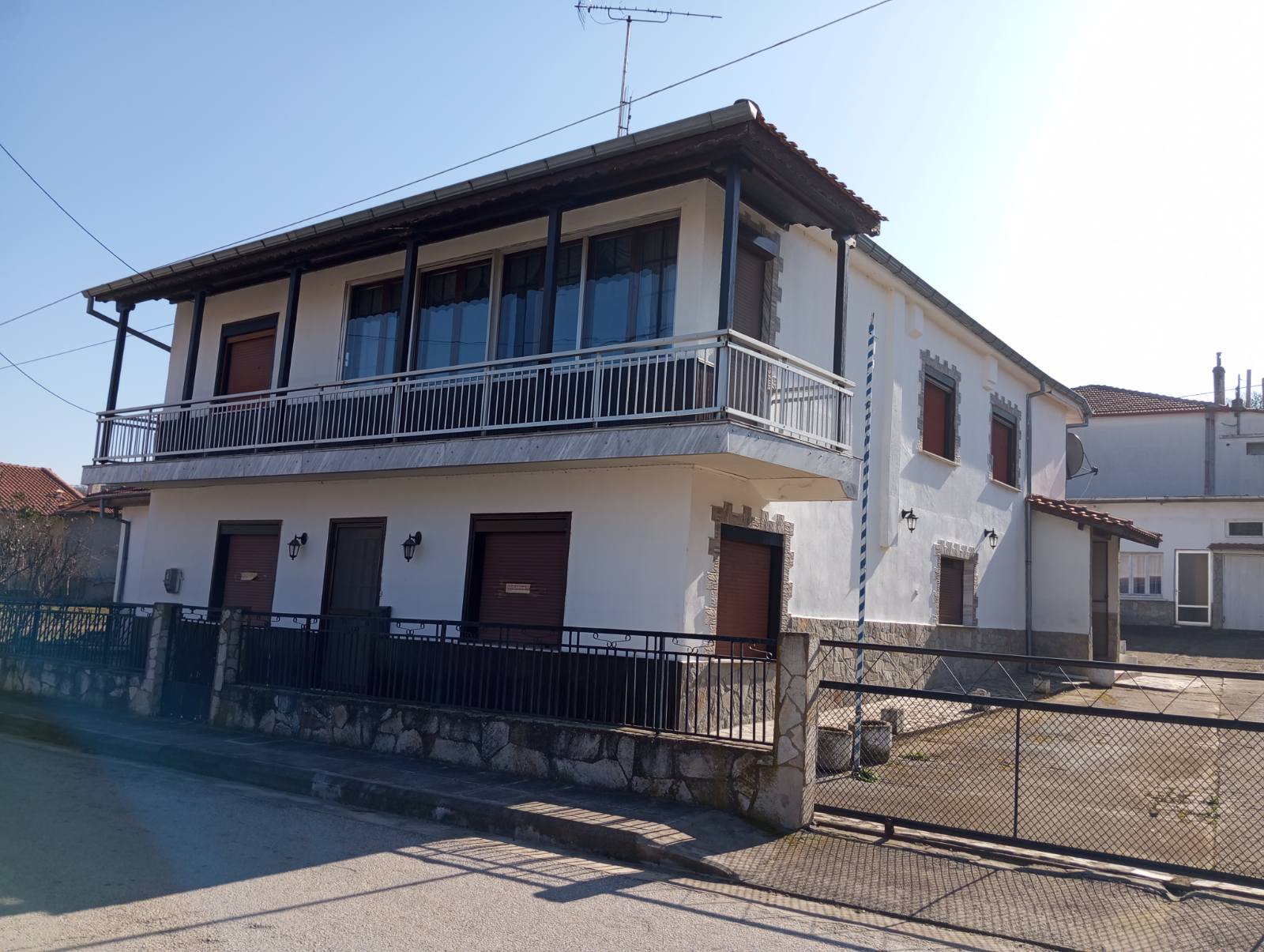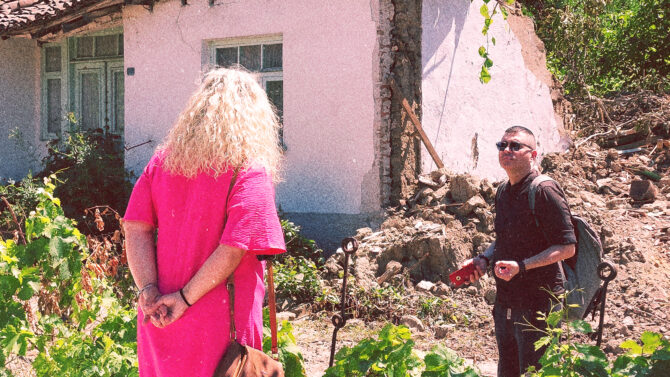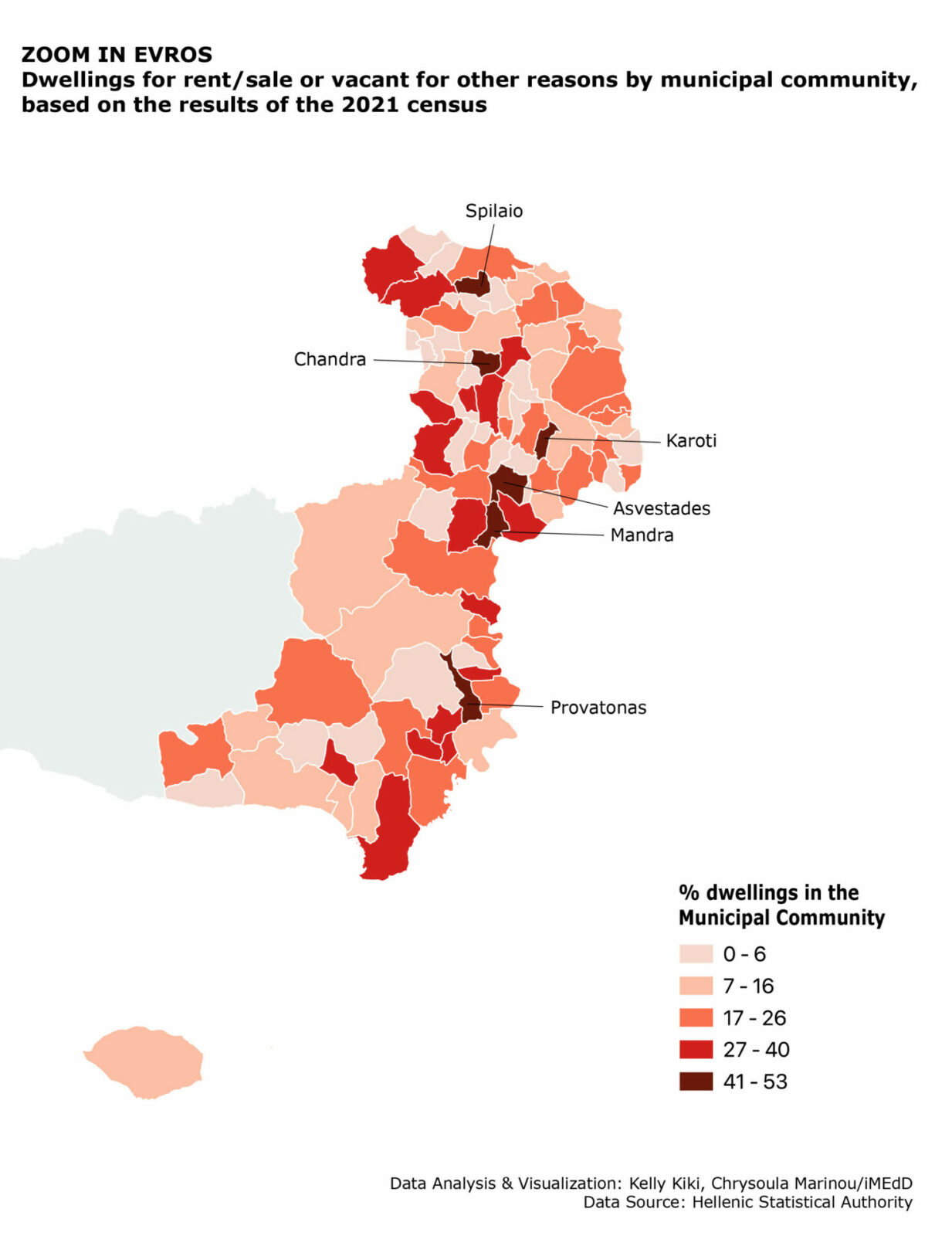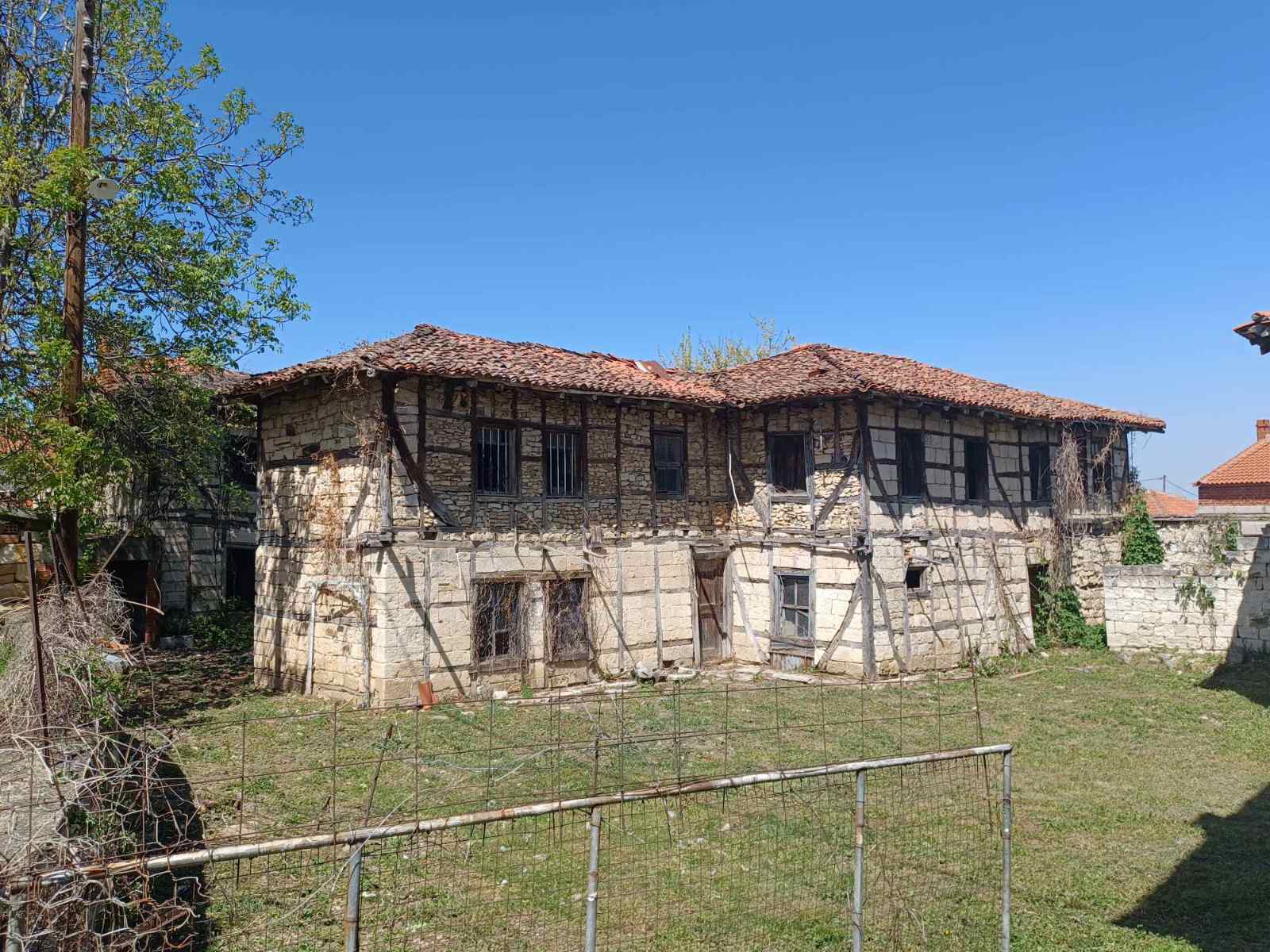The investigation for the podcast “Evros Behind the Fence” began by exploring the problems and the ambitions of the residents of Evros. The subsequent journey and the data research revealed details about vacant or for-sale houses, which recently captured the public’s attention due to their possible buyers.
The research for the podcast “Evros behind the fence” began with a round of phone calls to the villages of Trigono. I spoke with local council presidents, farmers and association presidents. They all pointed to the demographic collapse and the exodus of young people. But nothing had me prepared for what I saw as I walked through the streets of Ormenio, Spileo, and Krios. Hundreds of vacant homes, run-down properties and single-family homes in need of a buyer.
“I am selling a 100 square meter house with three bedrooms for 25,000 euros. It is in good condition and has a yard in the front and back, totaling over a quarter of an acre. My grandparents have been dead for years and my father has also passed away. I don’t go to Dikea. What can I do with it? It’s too big,” says Konstantinos Tzampazidis.
The 25-year-old electrician is a permanent resident of Orestiada. His family home is about half an hour away from the city, but nothing “pulls” him back to the village anymore. So, a few months ago he decided to sell the house his grandfather and grandmother left him.

Making the podcast “Evros Behind the Fence”

Journalist Apostolos Staikos travelled to northern Evros to document life in the remote border villages for iMEdD’s new podcast.
The story of the young man from Evros is a common one in the seventeen villages of Trigono, which today have no more than two thousand inhabitants. Young people who left to study and never came back old people who died, and houses that were abandoned to fate.
Many houses were abandoned years ago and are slowly falling apart, but many are in good condition and still habitable. There are also properties that are not available for sale or rent because there are many heirs who cannot come to an agreement. In addition, some people live permanently abroad and have no interest in the property they inherited.
According to the results of the 2021 Population – Housing Census*, there are 3452 dwellings in the villages of Trigono. Of these, 1774 are vacant. This is 51% of the houses in the area. According to the Hellenic Statistical Authority, a vacant dwelling is a dwelling found without tenants on the day of the census. The property could be rented, sold, or used as a vacation home or second home. It may also be empty because the owner has emigrated or it is being repaired. In the villages of Trigono, if we exclude the vacation and secondary residences, it appears that at the 2021 census, 1,306 (i.e. 38%) were for rent or sale or vacant for some other reason.
As for the 25-year-old electrician trying to sell his grandparents’ house, fortunately, he speaks good English. Otherwise, he would not be able to communicate with prospective buyers who ask him about the features of the house.
“Several people have asked to see the property, but none of the interested parties are Greek. It is very difficult for a family to move to the village. So far only Bulgarians call me and ask for information. I have shown the house to several couples, and I believe that the buyers will be from the neighboring country,” says Konstantinos Tzampazidis.
From Svilengrad to Trigono
From January 1, 2025 Bulgaria will be a full member of the Schengen area, which means that there will be no restrictions on movement.
In the neighboring country, the cost of living has risen, as have real estate prices. Nowadays in Svilengrad to buy an apartment between 60 and 70 square meters you need to have between 30,000 and 40,000 euros, which is quite expensive for the average Bulgarian. The city is also growing because of the casino, which attracts many visitors from Greece.
Svilengrad is only 21.5 km from Dikea, where you can find properties for sale from 5,000 to 25,000 euros. A few months ago, a Bulgarian couple bought a house for less than 20,000 euros. The couple now live in the village and commute daily to Svilengrad, where they work.
According to the 2021 census, the municipal community (Dikea, Dilofos, Krios, Palli) has 565 houses. Of these, 295 are vacant. And of those that were vacant, more than four in ten were not vacation or second homes, but homes for rent/sale or vacant for some other reason.
The issue came into the spotlight a few days ago, when eleven Members of Parliament from New Democracy submitted a parliamentary question regarding the purchase of real estate with funds originating from Turkey and Bulgaria.
The eleven MPs referred to an “aggressive” tactic and added that they have received complaints from notaries, lawyers, and citizens claiming that property and business purchases have multiplied, especially in the regions of Eastern Macedonia and Thrace, as well as the islands of the Eastern Aegean.
During our filming in Evros, the issue was also raised by the president of the local council of Metaxades.
“In recent months, four houses in our village have been sold to Muslims. They bought them for 20,000 to 25,000 euros. The issue is that the new owners neither live here nor rent them out. They bought them and left them closed. This is something that concerns us. I will say just one thing: Turkey thinks fifty years ahead. What are we doing?” stated Christos Kissoudis at the time.
Although a Turkish national cannot purchase property in Evros, in many cases the buyers are German citizens who also hold Turkish nationality. Furthermore, following legislative amendments made in 2011, a company headquartered in Greece or in another EU country can now purchase property in areas designated as “border zones.” Completion of the process no longer requires approval from the relevant committee, which used to include a representative from the Ministry of National Defense.
Currently, Greek authorities are investigating at least 130 of these property transactions, with officers from the National Intelligence Service (EYP) also involved in the process.
What does the data analysis from the latest censuses show
Vacant houses are more prevalent in municipalities of Evros, both compared to the national average and to the past, as shown by analyzing the housing census results, which are publicly available from the Hellenic Statistical Authority.
Specifically, excluding holiday and secondary homes, and focusing the analysis on houses that were for rent or sale or vacant for a third reason (migration, relocation, repairs, etc.) at the time of the census, it is found that in 2021, in Soufli, Didymoticho, and Orestiada, the percentage of these vacant houses was 25%, 21%, and 18%, respectively (among the highest in municipalities across Greece), while the national average in municipalities was 11%.
Ten years earlier, during the 2011 census, the corresponding percentages were 15% in Didymoticho, 14% in Soufli, and 13% in Orestiada, not significantly different from the national average of municipalities in Greece, which was then 12%.
“In the four villages of the community, there are definitely 65 to 70 houses that could be immediately habitable. They are in good condition, while some are villas, houses that would cost hundreds of thousands of euros in the cities. But here they sell for ten and twenty thousand. In recent years, only Bulgarians have been buying. It’s a good thing this couple came along and brought life to a house. Only we haven’t met them, I haven’t seen them around. I hope that the house will encourage them to participate in the life of the village,” says Sasa Pavlidou, president of the Dikea local council.
Apart from real estate, many young men marry Bulgarian girls, since there are no single Greek women living in the villages of Trigono. In the school year 2024-2025, the primary school of Dikea will have 40 students. Of these, 10 are from mixed marriages. There are 36 children attending middle school and high school. Of these, 11 have a father from Greece and a mother from Bulgaria.
Two weeks in one year
Ormenio is the northernmost village in Greece. Twenty years ago it had 570 inhabitants, now it has no more than 270. As for the houses, of the 356, 176 are vacant (2021 census data).
I asked the president of the local council, Stratos Vassiliadis, to walk with me and show me some houses. About two hundred meters from the village square, in a small alley, there are ten properties. Only one of them is inhabited, while the owner of the other one divides his time between Alexandroupoli and Ormenio. The remaining houses are in an intermediate state. They are not occupied, sold or rented.
Evros Behind The Fence

What happens in Evros when the wildfires die down and the border fence slips out of the spotlight? Journalist Apostolos Staikos travels to Northern Evros, exploring life in the remote border villages. He delves into issues of demographic collapse, the local economy, wildfires, and the border fence.
I’m no engineer, but I think most of them are in pretty good shape. Sure, they need a paint job or some repairs, but once renovated, they are ready to live in.
“Many people are reluctant to sell their parents’ house because they grew up there and have so many memories. They contain furniture and other valuables. There is little money in a sale, no incentive. So they come for a week at Easter and a week in the summer. They do basic maintenance, but in reality, these houses are unoccupied. They could have a different fate, but there are no people,” says Stratos Vassiliadis.
As the president of the local council continues to show me the houses of Ormenio, I recall a friendly couple in Athens who are looking in vain to rent a house at a reasonable price. For a two-room apartment in decent condition in Kallithea or Petralona, they estimate that they have to pay 550 to 650 euros. The co-financed “My House I & II” programs provide low-interest loans, but at the same time led to a new increase in real estate prices in large cities. While this is the situation in Athens and Thessaloniki, hundreds of houses have been abandoned in northern Evros.

Real estate agent Yannis Karras has his office in the center of Orestiada. I asked for an estimate of the number of houses for sale or rent in the seventeen villages of Trigono. He replied that about 100 houses are currently being sold, but he could not give an exact number. The real estate market here does not follow the rules of large urban centers.
“Many people give a price for their property as soon as they find out that a Bulgarian is going around the villages looking for a house. They don’t advertise, they don’t go to realtors, they don’t sweat to sell. In one year five properties were sold in Nea Vyssa, so we are talking about a limited demand. There are opportunities in Orestiada. Some time ago a renovated studio of 30 square meters was sold for 20,000 euros. The new owner will surely rent it for 250, maybe even 300 euros. People who have no connection to the area are also looking for opportunities in the city. Right now I have a client from Preveza who has money and wants to invest,” says real estate agent Yannis Karras.
The mansions of Metaxades
Metaxades is a lowland settlement, and since 2011, it belongs to the municipality of Didymoteicho (Kallikratis plan). By a presidential decree of 1978 and the decision of the then Prefecture of Evros, it was characterized as a traditional settlement with special architectural features. According to the 2021 census, the municipality has 547 dwellings. Of these, 319 are vacant. The problem with Metaxades is not only that there are many empty houses but that they are buildings of great architectural value and beauty. Some people call the area “the Zagorochoria of Evros”, and they are probably not wrong.
A typical house in Metaxades is two-story, with many facings and a large number of rooms. The sturdy wooden frames are filled with large pieces of soft limestone quarried in the area, while stone is the main building material.

“There is no program and no one cares about these wonderful houses. Some of them are ruined, unfortunately it is too late to save them. Some are near roads and alleys, so there is a risk that they could collapse and kill someone. But there’s nothing I can do. Since they are declared landmarks, the relevant committee of the Ministry of Culture has to come from Thessaloniki. This committee must inspect, approve, and then demolish what is left of the house. I have sent documents, I have informed them, but I am still waiting,” says Christos Kissoudis, president of the local council of Metaxades.
In addition to the desolation of northern Evros and the abandonment of hundreds of houses, the case of Metaxades also highlights the loss of the region’s architectural wealth. Today, stone houses sell for 20,000 to 25,000 euros. Yet, despite the low prices, few people show interest in the village’s real estate.
Research / Reporting: Apostolos Staikos
Data Analysis & Visualization: Kelly Kiki, Chrysoula Marinou
Translated by; Evita Lykou
Photo Feature: Georgis Sarantinos
You can listen to all episodes of iMEdD’s podcast “Evros Behind the Fence” here.
